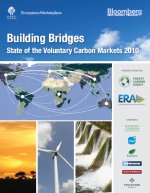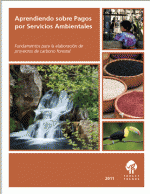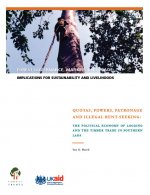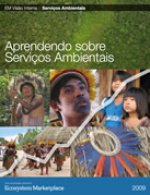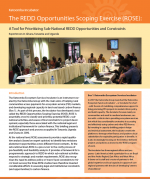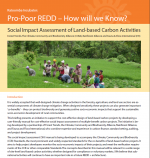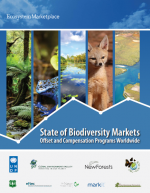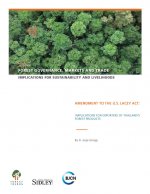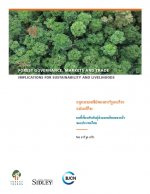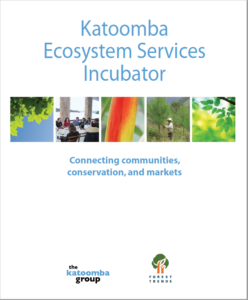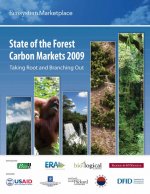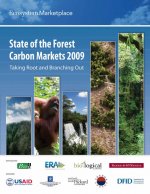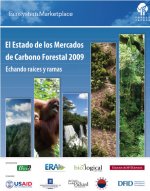State of the Voluntary Carbon Markets 2010
Building Bridges
By Kate Hamilton, Milo Sjardin, Molly Peters-Stanley, Thomas MarcelloThis fourth annual State of the Voluntary Carbon Markets report is designed to give a market‐wide perspective on trading volumes, credit prices, project types, locations, and the motivations of buyers in this market. Findings are based on data voluntarily reported by 200 offset suppliers, as well as exchanges and registries. Because of the challenges of […]
Aprendiendo sobre Pagos por Servicios Ambientales
El propósito de este manual es introducir líderes comunitarios, agentes del gobierno, técnicos de ONGs y otros actores a los conceptos básicos relacionados al cambio climático y pagos por servicios ambientales, con un enfoque en el mercado de carbono, de una forma clara y didáctica.
Quotas, Powers, Patronage, and Illegal Rent-Seeking
The Political Economy and the Timber Trade in Southern Laos
By Ian G. BairdForests are extremely important to the people of Laos. They are the basis for the livelihoods of most of those living in rural areas, especially the poor and Laos’ large population of indigenous peoples. Forests are also an important source of government revenue, and Lao forests are being increasingly recognized for the high levels of […]
Email Signup
Subscribe to any of Forest Trends’ mailing lists to keep up with the news, publications, and events that interest you.
Having Trouble?
If you experience any technical difficulties on our site, please contact Genevieve Bennett, Communications Manager.
Aprendendo sobre Serviços Ambientais
By Marina CamposPagamentos por serviços ambientais (PSA), tais como os mercados de carbono, têm o potencial de gerar novas fontes de recursos para a conservação da biodiversidade e melhorar os meios de sustento das comunidades locais. Na medida em que esquemas de crédito de carbono, tais como seqüestro de carbono por reflorestamento e redução das emissões do […]
The REDD Opportunities Scoping Exercise (ROSE) – Brief:
A Tool for Prioritizing Sub-National REDD Opportunities and Constraints Experiences in Ghana, Tanzania and Uganda
By Katoomba IncubatorPro-Poor REDD – How will we Know?
Social Impact Assessment of Land-based Carbon Activities
By Forest Trends, Rainforest Alliance - The Climate, Community and Biodiversity Alliance (CCBA), Fauna & Flora International (FFI)State of Biodiversity Markets 2009
Offset and Compensation Programs Worldwide
By Becca Madsen, Nathaniel Carroll, Kelly Moore BrandsThis report provides the status and trends of biodiversity offset and compensatory mitigation programs by geographical region. In each section, the report summarizes the total active programs and developing activities, and broad metrics like total known payments and land area protected or restored. In each region, we also analyze the characteristics of offset programswhat drives […]
Amendment to the U.S. Lacey Act
Implications for Exporters of Thailand's Forest Products
By R. Juge GreggA new law gives the U.S. government the power to fine – and even jail – individuals and companies who deal in illegally harvested or trafficked wood products. The U.S. government can even use this law, called the Lacey Act, to impose significant penalties on individuals and companies who do not realize that their wood […]
Dependent Documents
[Thai Version] Amendment to the U.S. Lacey Act
Implications for Exporters of Thailand's Forest Products
By R. Juge GreggKatoomba Ecosystem Services Incubator
Connecting communities, conservation, and markets
The Katoomba Ecosystem Services Incubator is a specialized vehicle to provide strategic support to projects in a way that facilitates access to the massive financial flows and business interest that have largely been directed elsewhere. Our aim is to increase high-quality, solid supply of ecosystem services.
State of the Forest Carbon Markets 2009
Taking Root and Branching Out
By Katherine Hamilton, Unna Chokkalingam, Maria Bendana - Ecosystem Marketplace, Ecosystem Marketplace, Ecosystem MarketplaceThis report was created to increase transparency and answer fundamental questions about the supply of forestry-based carbon credits, such as transaction volumes, credit prices, hectares influenced and tenure rights. It outlines the aggregate numbers from our survey of 61 project developers and 34 intermediaries representing 226 projects across 40 countries. This report is entirely based […]

